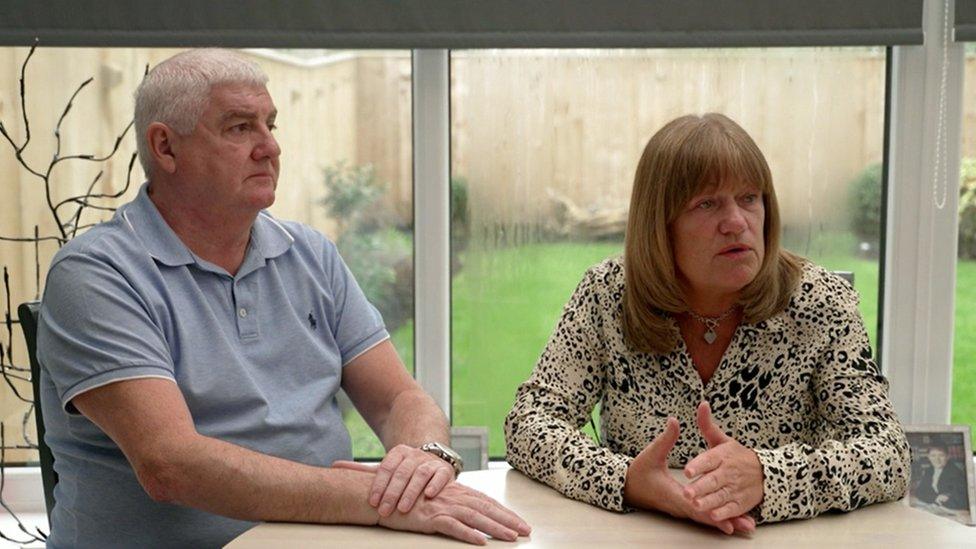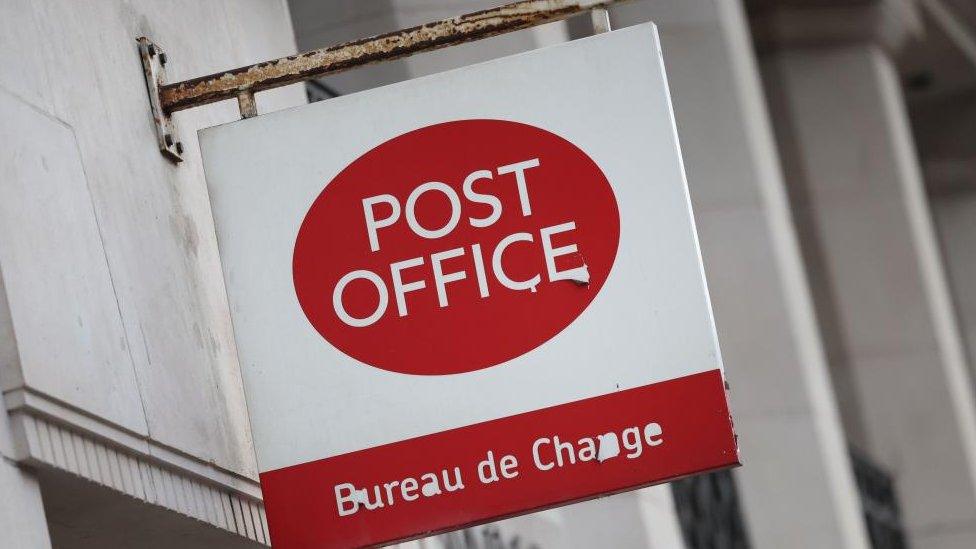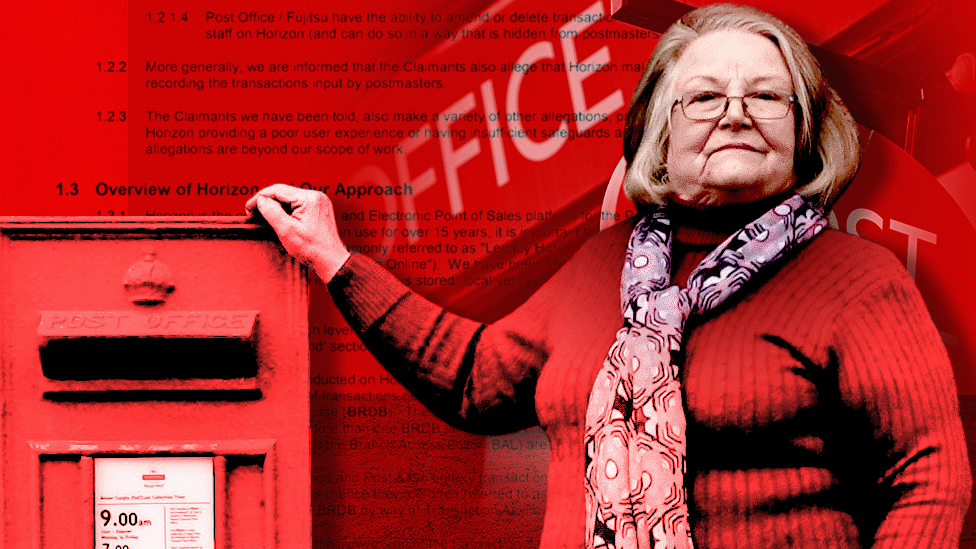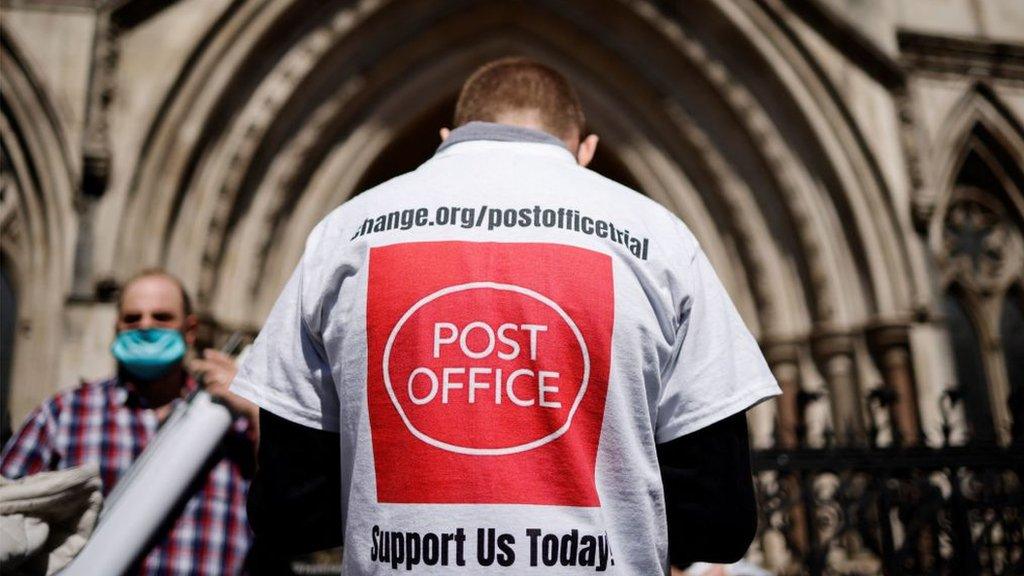'I'm terrified' - Post Office victim still fears seeing old customers
- Published
"I will never come back again" - Sharon visits her old post office
The public inquiry into the Horizon scandal will resume this week, with senior Post Office bosses among those called to give evidence. Away from the formal hearings, many of the victims of the scandal are still finding the courage to confront the traumas of the past.

"I'm fine," says Sharon Brown, as she gets closer to her old post office, "I just feel a bit sick." She says her heart is racing.
As the car pulls up, Sharon's old post office comes into view. It is the first time she's been back since she was accused of being a thief, turning her life upside down. The post office is now gone, replaced by a shop selling vapes, cakes and shakes. It is adorned with a rainbow LED facade.
More than a decade ago, Sharon was accused of false accounting by the Post Office and of taking £36,000. Like many others, she has only recently felt able to tell her story.
Speaking to BBC Breakfast, Sharon says she and her husband, Kevin, are still in debt because of it. She says she no longer speaks to members of her family who doubted her innocence, and that she is still nervous of walking around the area where her post office used to be.
When asked what it feels like to see her former shop again, after a moment of silence, she replies: "Awful isn't it? It's awful. They just don't know what they've done to people, to their post office."
'A massive black hole'
Sharon and Kevin first bought the post office in Pennywell, Sunderland, in 2006. When money mysteriously started disappearing from the business, the couple used their life savings to cover the shortfall.
Kevin says there was "a massive black hole". The couple still have two charging orders on their home, he adds. "We still owe debt, we've still got debt."
Like many sub-postmasters and sub-postmistresses who were caught up in the Horizon scandal, Sharon mistakenly assumed she had done something wrong. "I just couldn't figure it out. I didn't even consider that it was the computer. It didn't even enter my head."
Sharon was suspended by the Post Office in 2012, she resigned in 2013. The Post Office sent investigators to their home to search for the missing money.

Kevin and Sharon Brown used their life savings to cover the shortfall after money mysteriously started disappearing from their post office.
The investigators went through their kitchen cupboards and drawers and even searched the fridge. "I said what are you looking for in there? He said: 'People hide money in different places all the time'."
"In yourself you knew you hadn't took a penny, but nobody else believed you, because the Post Office was telling everybody you did," she adds. "For all you want to fight and shout and scream that you're innocent, they're still going to take [the Post Office's] side."
Sharon fell out with members of her own family. She says she's still not been in touch with them. "I don't see any of my family, none of them. I haven't for years."
And she says the emotional stress became unbearable. "I just locked myself in the house, didn't go out shopping, didn't go out, didn't see my friends, didn't do anything," says Sharon. "I just didn't want to be here - just didn't want to be here at all."
As her business and life unravelled, Sharon says she "nearly did something stupid" in the early hours of one morning. She says she stopped herself after she saw photographs of her two children.
"If I hadn't seen the pictures of the bairns, I wouldn't be sitting with you now, and I just looked at them and thought, 'God, I can't leave them bairns'," she says.
I loved going to work
More than 900 sub-postmasters and postmistresses were wrongly prosecuted for stealing money after faulty computer software - called Horizon - said money was missing from post office branch accounts.
The public inquiry into the scandal will resume on Tuesday. The latest hearings will last 15 weeks, and witnesses, external will include key figures at the heart of the scandal - including the sub-postmaster and campaigner Alan Bates and former Post Office chief executive Paula Vennells.
In 2017, a group of 555 sub-postmasters - which included Sharon - took legal action against the Post Office. In 2019, it agreed to pay them £58m in compensation, but much of the money they received was swallowed up by legal fees.
As of 15 January 2024, only 95 convictions had been overturned, external.
Earlier this year, the government introduced new legislation to overturn the convictions of sub-postmasters who were the victims of what has been called the biggest miscarriage of justice in UK history.
The new law is designed to speed up the process of both clearing their names and paying out compensation.
Sharon wasn't eventually prosecuted by the Post Office. She says she enjoyed being a sub-postmistress. "I just loved going to work, loved the customers. There was never any getting up and going, 'oh God, work again today'. It was a pleasure to go to work."
Sitting in a car outside her old post office, she says: "I could have been still there now, still working, instead of being in this state all the time, and I just feel sick as a dog, stomach's going, and terrified because I see many of my own customers, you know."
"I know I haven't done nothing wrong, I should be alright to be here, and I'm not," she says. She says, despite the world now knowing her innocence, she still can't get out of the car and walk around the area, for fear of seeing a customer. "I will never come back again."
Sharon's mother died before the charges against her were dropped by the Post Office.
"I talk to them all the time," Sharon says of her mother and father. She has a photograph of them in her house. "I say, 'I'm alright now, mum, everything is sorted. I'm alright now'."

BBC Breakfast came live from Fenny Compton, the village where former sub-postmasters held their first meeting, on Monday. The programme brought together 60 people whose lives have been changed by the scandal.
You can watch the programme on BBC iPlayer.


Are you affected by the issues raised in this story? Share your experiences by emailing haveyoursay@bbc.co.uk, external.
Please include a contact number if you are willing to speak to a BBC journalist. You can also get in touch in the following ways:
WhatsApp: +44 7756 165803
Tweet: @BBC_HaveYourSay, external
Please read our terms & conditions and privacy policy
If you are reading this page and can't see the form you will need to visit the mobile version of the BBC website to submit your question or comment or you can email us at HaveYourSay@bbc.co.uk, external. Please include your name, age and location with any submission.
Related topics
- Published29 March 2024

- Published28 March 2024

- Published12 January 2024

